Hypothalmus - Study guides, Class notes & Summaries
Looking for the best study guides, study notes and summaries about Hypothalmus? On this page you'll find 209 study documents about Hypothalmus.
Page 4 out of 209 results
Sort by
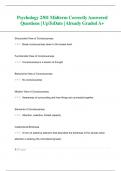
-
Psychology 2301 Midterm Correctly Answered Questions| UpToDate | Already Graded A+
- Exam (elaborations) • 19 pages • 2024
- Available in package deal
-
- $11.49
- + learn more
Structuralist View of Consciousness : Break consciousness down to the lowest level Functionalist View of Consciousness : Consciousness is a stream of thought Behaviorist View of Consciousness : No consciousness Modern View of Consciousness : Awareness of surrounding and how things are connected together Elements of Consciousness : Attention, selective, limited capacity Inattentional Blindness : A form of selective attention that describes the blindness of the senses when attention i...
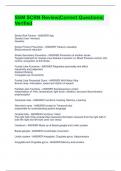
-
SSM SCRN Review|Correct Questions| Verified
- Exam (elaborations) • 13 pages • 2024
-
- $13.49
- + learn more
Stroke Risk Factors - ANSWER Age Gender (men >women) Genetics Stroke Primary Prevention - ANSWER Tobacco cessation Blood pressure reduction Stroke Secondary Prevention - ANSWER Prevention of another stroke Targets treatment for change once disease is present i.e. Blood Pressure control, LDL control, recognition of S/S stroke Frontal Lobe Functions - ANSWER Regulates personality and affect Impulsivity and judgement Abstract thinking Conjugate eye movements Frontal Lobe Prece...
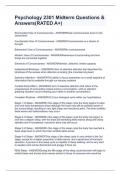
-
Psychology 2301 Midterm Questions & Answers(RATED A+)
- Exam (elaborations) • 8 pages • 2024
-
Available in package deal
-
- $12.39
- + learn more
Structuralist View of Consciousness - ANSWERBreak consciousness down to the lowest level Functionalist View of Consciousness - ANSWERConsciousness is a stream of thought Behaviorist View of Consciousness - ANSWERNo consciousness Modern View of Consciousness - ANSWERAwareness of surrounding and how things are connected together Elements of Consciousness - ANSWERAttention, selective, limited capacity Inattentional Blindness - ANSWERA form of selective attention that describes the bl...
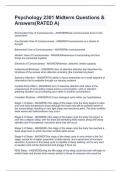
-
Psychology 2301 Midterm Questions & Answers(RATED A)
- Exam (elaborations) • 8 pages • 2024
- Available in package deal
-
- $14.49
- + learn more
Structuralist View of Consciousness - ANSWERBreak consciousness down to the lowest level Functionalist View of Consciousness - ANSWERConsciousness is a stream of thought Behaviorist View of Consciousness - ANSWERNo consciousness Modern View of Consciousness - ANSWERAwareness of surrounding and how things are connected together Elements of Consciousness - ANSWERAttention, selective, limited capacity Inattentional Blindness - ANSWERA form of selective attention that describes the bl...
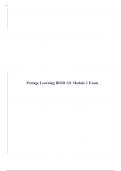
-
Portage Learning BIOD 121 Module 1 Exam
- Exam (elaborations) • 12 pages • 2024
- Available in package deal
-
- $12.00
- + learn more
Portage Learning BIOD 121 Module 1 Exam Module 1 Exam 1. Name the region of the brain that plays a role in whether we feel hungry or full. What about blood can trigger this region to make us want to eat? The hypothalamus is the region of the brain that plays a role in whether we feel hungry or full. Hormones, such as ghrelin, are released from the stomach, enter the bloodstream, and go to the hypothalamus to tell us we are hungry and to find food. Another association with our blood and sense of ...
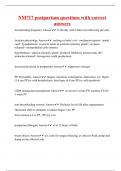
-
NM717 postpartum questions with correct answers
- Exam (elaborations) • 5 pages • 2023
- Available in package deal
-
- $14.99
- + learn more
breastfeeding frequency Answer 8-10x/day with 10min of swallowing per side lactation physiology Answer sucking or baby's cry> mechanoreceptors> spinal cord> hypothalmus> oxytocin neuro in posterior pituitary gland> oxytocin released> myoepithelial cells contract hypothalmus> anterior pituitary gland> prolactin inhibitory neuron turns off> prolactin released> lactogenisis (milk production) increased prolactin in postpartum Answer suppresses estrogen PP Thy...
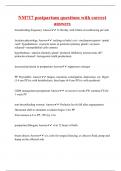
-
NM717 postpartum questions with correct answers|100% verified
- Exam (elaborations) • 5 pages • 2024
-
- $10.49
- + learn more
NM717 postpartum questions with correct answers breastfeeding frequency Answer 8-10x/day with 10min of swallowing per side lactation physiology Answer sucking or baby's cry> mechanoreceptors> spinal cord> hypothalmus> oxytocin neuro in posterior pituitary gland> oxytocin released> myoepithelial cells contract hypothalmus> anterior pituitary gland> prolactin inhibitory neuron turns off> prolactin released> lactogenisis (milk production) increased prolactin i...
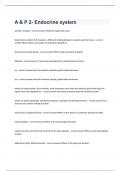
-
A&P 2 University Of Memphis - A & P 2- Endocrine system with answers graded A+
- Exam (elaborations) • 6 pages • 2024
-
Available in package deal
-
- $13.49
- + learn more
A&P 2 University Of Memphis - A & P 2- Endocrine system with answers graded A+specific receptors - correct answer What do target cells need blood levels, relative # of receptors, affinity of binding between receptors and hormones - correct answer What 3 factors do target cell activation depend on stomach and sweat glands - correct answer What makes up exocrine glands diabetes - correct answer If you have hyperglycemia it would mean you have no - correct answer Does the posterior pitu...
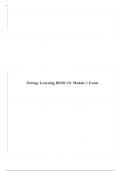
-
Portage Learning BIOD 121 Module 1 Exam
- Exam (elaborations) • 12 pages • 2024
- Available in package deal
-
- $12.00
- + learn more
Portage Learning BIOD 121 Module 1 Exam Module 1 Exam 1. Name the region of the brain that plays a role in whether we feel hungry or full. What about blood can trigger this region to make us want to eat? The hypothalamus is the region of the brain that plays a role in whether we feel hungry or full. Hormones, such as ghrelin, are released from the stomach, enter the bloodstream, and go to the hypothalamus to tell us we are hungry and to find food. Another association with our blood and sense of ...
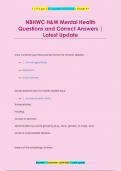
-
NBHWC H&W Mental Health Questions and Correct Answers | Latest Update
- Exam (elaborations) • 3 pages • 2024
- Available in package deal
-
- $9.99
- + learn more
most common psychosocial risk factors for chronic disease, → ::- unmanaged stress → depression → social isolation Social determinants for health-related issue → ::- socioeconomic status, transportation, housing, access to services, discrimination by social grouping (e.g., race, gender, or class), and social or work-related stressors. basics of the physiology of stress, 1 | P a g e | © copyright 2024/2025 | Grade A+ Master01 | September, 2024/2025 | Latest update → :...

That summary you just bought made someone very happy. Also get paid weekly? Sell your study resources on Stuvia! Discover all about earning on Stuvia


